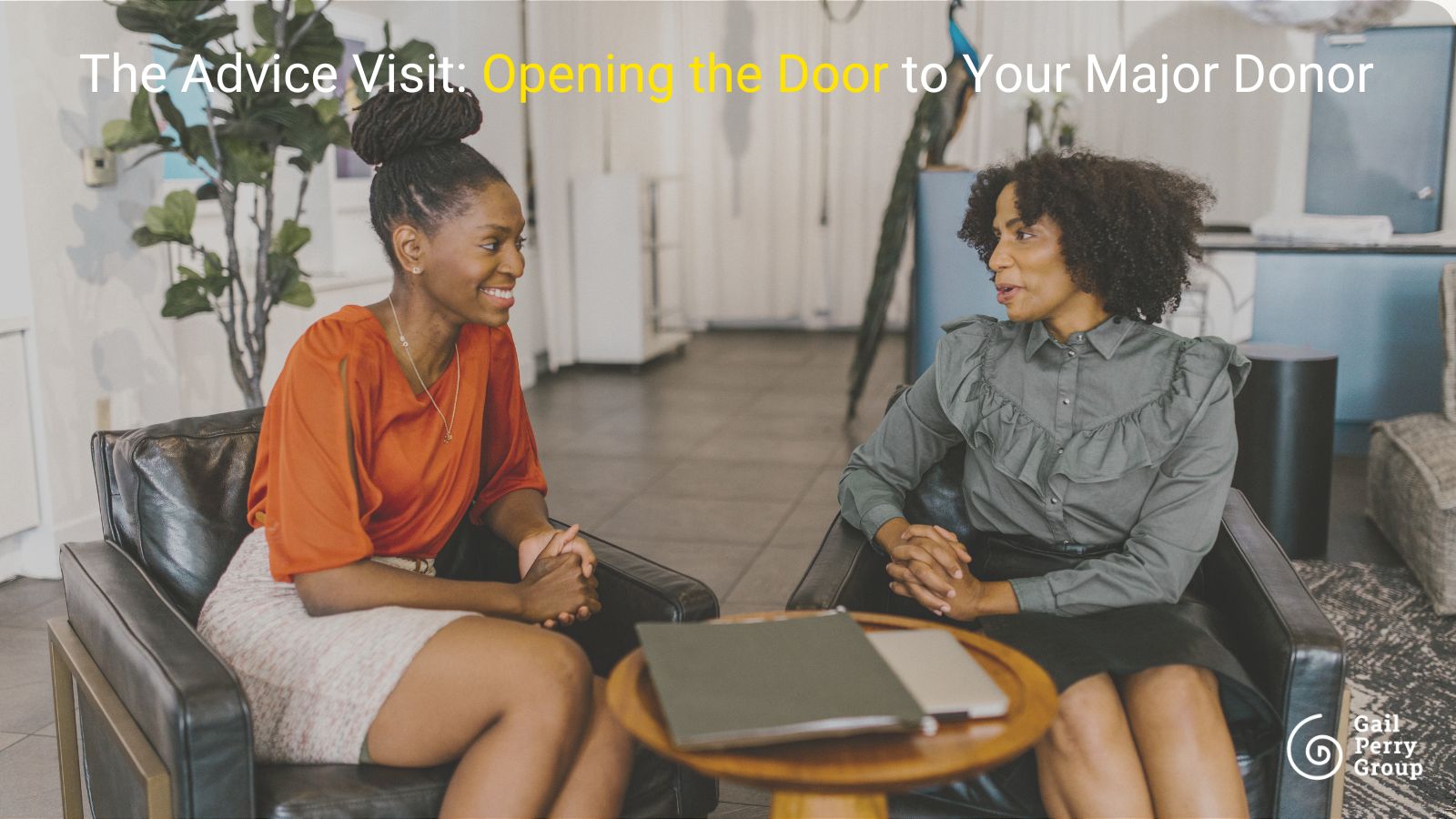The Advice Visit: Opening the Door to Your Major Donor
Advice Visits are one of our golden tools to get to know prospective major gift donors and discover what’s on their mind. They are a key step in the qualification and cultivation process for major donors.
Advice Visits are based on the old adage:
“If you want someone to give you advice, just ask for money.
If you want money, then ask for advice.”
This makes sense:
Receive expert advice. Direct to your inbox. Subscribe
Asking prospective donors for their opinion and guidance always helps to create a closer relationship between the donor and your organization.
And we all know that good fundraising is all about INVOLVING the donor — not just ASKING for money. So, Advice Visits are part of a process to develop long-term, sustainable relationships with your donors.
Advice Visits also practice one of our favorite fundraising rules:
“Treat donors like real people, not like pocketbooks. Ask them for MORE than just money.”
Remember, you honor your donor by asking for more than money. Many of your major donors want to get to know you and your work. You’ve got to create the space for your donors to share their thoughts and ideas.
This is a great strategy because you really DO want to hear what your donor is thinking. It’s the basis of a deeper relationship with your donor that will make the donor intrinsically happy because they are involved with a cause they care about.
We all fret about “Donor Engagement.” Well, the essence of donor engagement is sitting in conversation with your donor, and sharing ideas.
What is an Advice Visit?
It’s a personal one-on-one meeting between you and a potential or current major donor to your organization. This meeting is called the Advice Visit, because that is truly what you are after — advice.
Find out how we can help you achieve your fundraising goals with world-class consulting and custom training.
This visit is emphatically not about money.
Your ONLY goal for visiting this person is to ask them what they think of your project, your organization, your fundraising, your initiatives, and your vision. And you ask them for some serious guidance.
It is an informational meeting, much like a feasibility study interview. In the world of major gifts, we use Advice Visits as a discovery and qualification step.
What kind of advice do you ask for?
Please note you are typically not asking for advice and input on any programmatic area – it is clearly inappropriate to do that. You should never ask donors, of course, for input on artistic direction, programming, or advice on how you carry out your work.
What you ARE asking for, however, is their input on fundraising and visibility issues:
- Who needs to be involved with our cause?
- What do you think of our project?
- How can we pull it off financially?
- How can we how get more VIP donors to support our cause?
- Who are we missing?
- How can we reach our goal?
It is always beneficial to get other people’s thoughts, especially if the thinking comes from important philanthropists and donors with deep pockets. Their advice, in this context, can open doors for you to new donors, help you reshape your appeal to these donors, and can even help you structure the lead gifts to your capital campaign.
“Can I Pick Your Brain?” Advice Visits Can Open Important Doors
Are you trying to get in the door to see your big donor?
The best way is to ask the person for their advice. Try emailing with:
“We have an initiative up our sleeve. Could you spare a few minutes for coffee with me so I can get your thoughts about it? I’d love to pick your brain.”
Or,
“My organization is trying to do xxxxx, and I am not sure how we can accomplish this. May I come ask your advice and get the benefit of your perspective?”
Advice Visits are easy; in fact, there is not a better door opener and cultivation tool. You can do more in a half an hour with one important prospect than you can do in an entire evening of small talk at an event.
This is a perfect opportunity to promote your cause and cultivate a potential donor in a direct, personal way.
Donors love to be asked for advice.
The idea is that anybody will be willing to talk to you if you are seeking their advice and counsel. Of course they’ll see you — because guess what — they get to talk about themselves.
They get to do all the talking. Who wouldn’t agree to a meeting where they got to do all the talking — and better yet, dispense advice?
People are usually complimented when someone approaches them to ask for advice. In fact, you will be surprised at the number of doors that will open if you just approach donors this way.
Also, very important to remember: the more important the VIP donor is, the more THEY expect to be doing the talking. They expect to be giving you the benefits of their thinking and wisdom.
If you have never tried an Advice Visit, then a world of possibility and connection awaits you.
People want to help nonprofit causes because they care about their communities, regions, country, and world.
You will find help where you seek it, and you will be particularly successful because you are not asking directly for money.
What Do You Get from an Advice Visit?
- FEEDBACK on your case. They’ll tell you what they think. They’ll shoot holes in your case – and you need the feedback.
- YES OR NO? They’ll tell you whether they personally may be a potential supporter or not.
- The person being visited will invariably give you an important lead or suggestion that will help you further your cause.
- HELP Best of all, the person almost always offers to do something to help you. That means they are joining the cause and becoming invested in your success.
Bottom Line on Advice Visits: Try asking your major gift prospects for something besides money.
Remember, you honor your donor by asking for her help. Otherwise, you’ll always be making her feel that all you want from her is her money.
As always, it is a pleasure to share our weekly insights with you as we cover important fundraising strategies.
If your organization is planning a capital campaign or expanding your major gifts program – we can help. Send an email to coaching@gailperry.com if you’d like to schedule a free strategy call with us.




